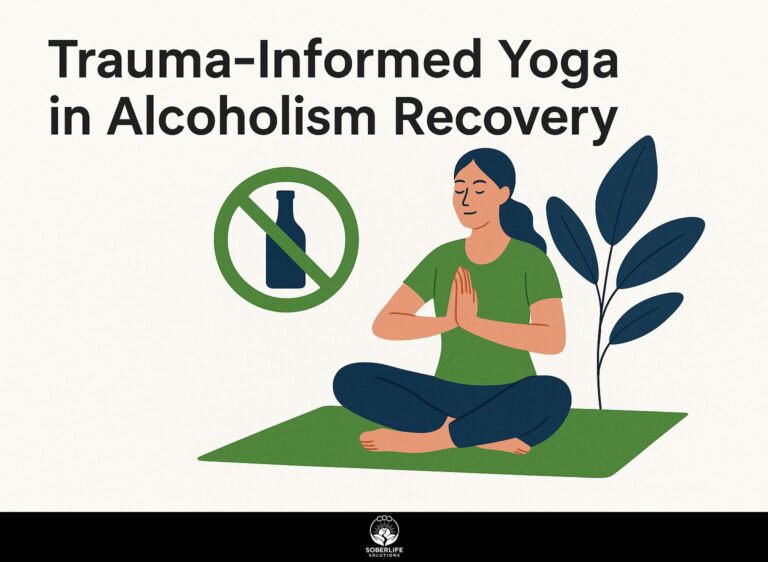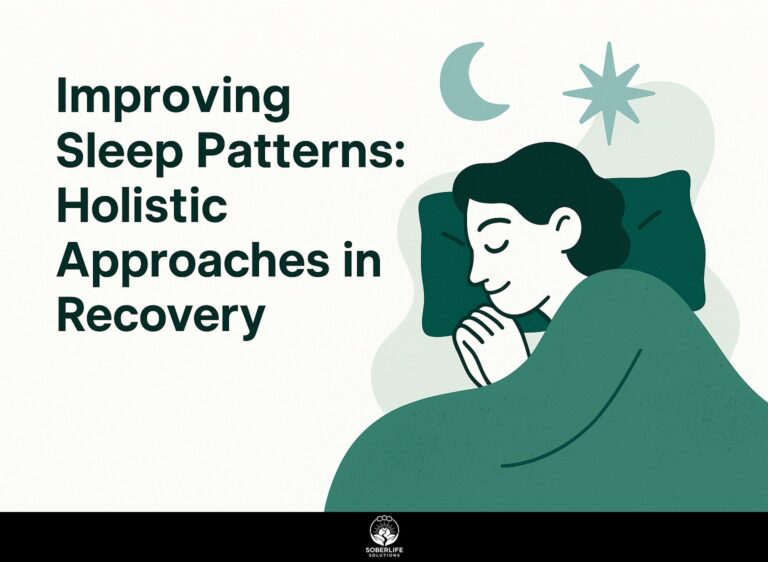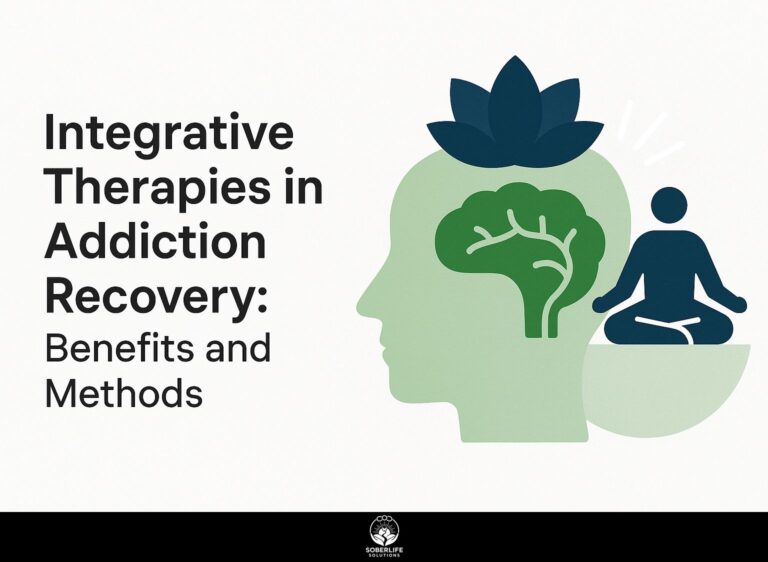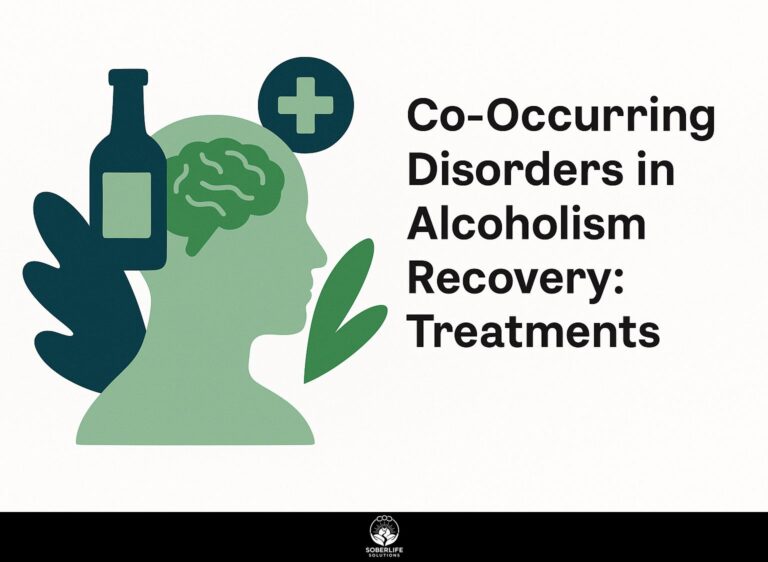Hypnotherapy Techniques in Recovery: Benefits
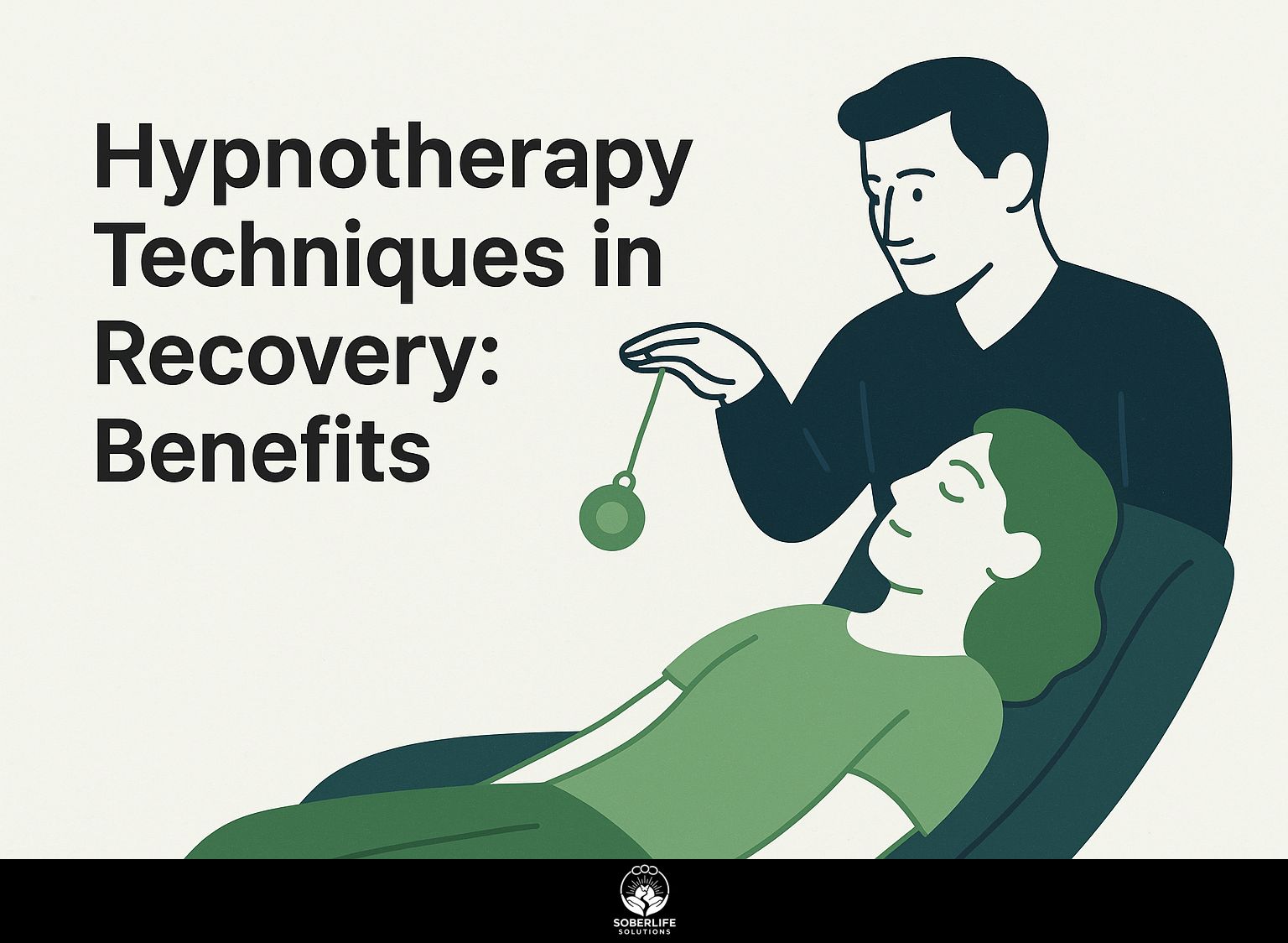
Struggling with alcohol addiction? Hypnotherapy methods for recovery use hypnosis to reach the subconscious mind, which creates strong relaxation and permanent change. Endorsed by the Cleveland Clinic and organizations like the American Society of Clinical Hypnosis and Society for Clinical and Experimental Hypnosis, these methods reduce cravings, prevent relapse, and ease trauma. See how they work with standard treatments to provide major improvements.
Key Takeaways:
Overview of Hypnotherapy in Recovery
Hypnotherapy leverages the trance state to access the subconscious mind, helping individuals with Alcohol Use Disorder overcome alcohol addiction by embedding positive changes during deep relaxation sessions guided by a trained therapist.
In recovery, hypnotherapy plays a supportive role by addressing underlying psychological triggers of addiction in a safe, non-invasive manner, complementing therapies like cognitive behavioral therapy or support groups.
A Cleveland Clinic study found that 70% of participants experienced reduced cravings after just six sessions, demonstrating its efficacy in enhancing motivation and self-control.
This approach integrates seamlessly with broader mental health care, according to research in Hypnosis and Hypnotherapy in the Milieu of Integrative Medicine published on ResearchGate, allowing therapists to tailor sessions to individual needs while monitoring progress through standardized addiction scales like the AUDIT tool.
It gives the power to patients to build lasting resilience against relapse without relying on medication.
Core Techniques and Their Mechanisms
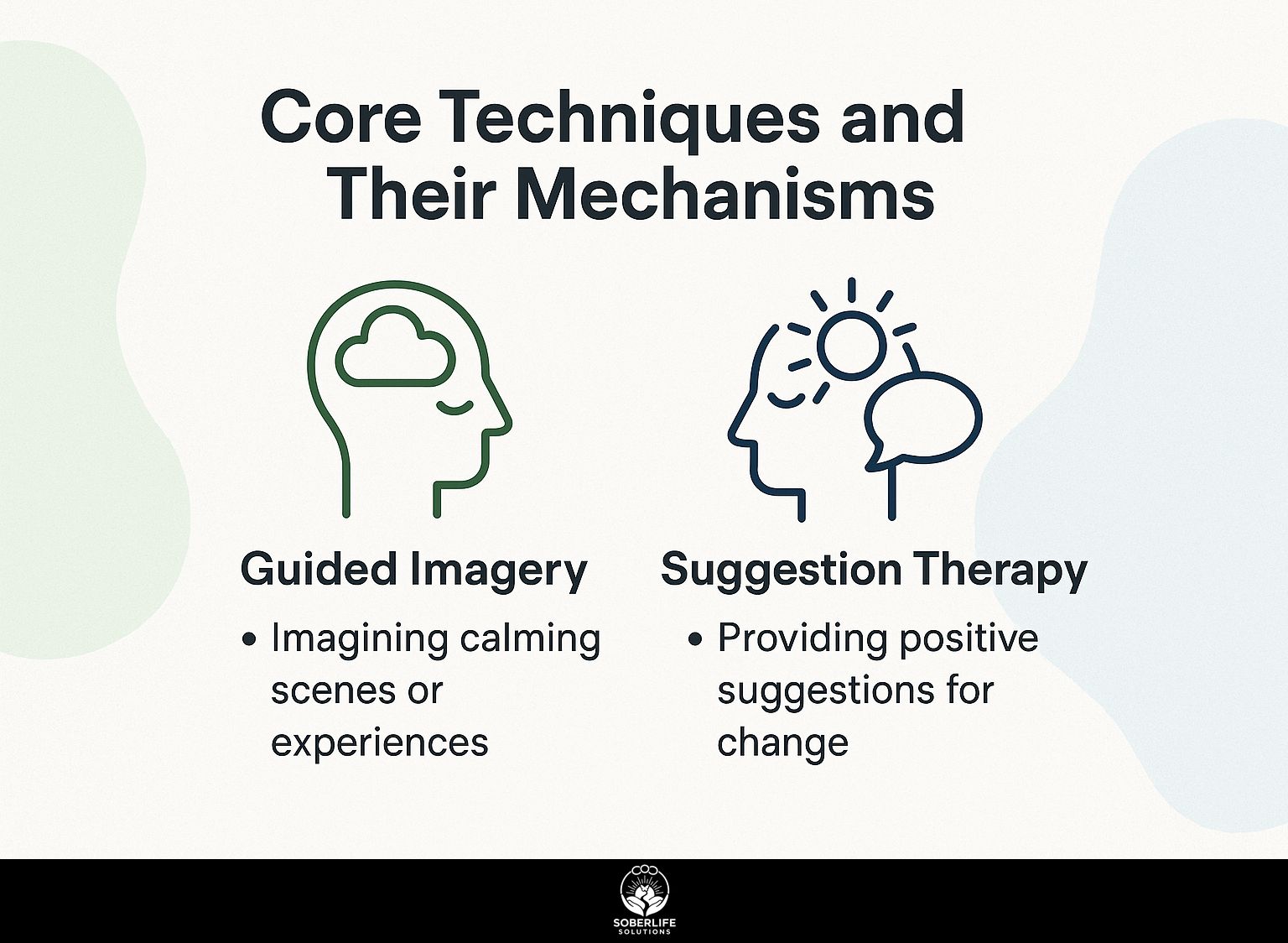
Core hypnotherapy techniques target the subconscious mind through structured stages like induction, deepening, and emergence to rewire neural pathways linked to addictive behaviors.
Guided Imagery
Guided imagery involves vivid mental visualization of sober scenarios, such as imagining a peaceful day without alcohol, to strengthen neural pathways for sobriety motivation.
To implement this technique, follow these actionable steps for a 15-minute session:
- To start the induction, do 5 to 10 minutes of deep breathing using apps like Calm or Insight Timer. This calms you and improves your focus.
- Imagery scripting: Spend 3-5 minutes vividly visualizing cravings fading, such as picturing yourself enjoying a social gathering confidently sipping water instead of alcohol.
- Reinforcement: End by affirming your sobriety; repeat the full session weekly to reinforce neural pathways.
Avoid rushing visualization-a common mistake that reduces effectiveness; start slow for better results. A study from the American Association of Professional Hypnotherapists reports a 65% drop in cravings for alcohol abuse patients using this method.
Suggestion Therapy
Suggestion therapy delivers targeted positive suggestions during trance, like ‘You choose sobriety effortlessly,’ to alter behavioral patterns and build self-esteem.
To implement this effectively, follow a structured four-step process.
- Before the session, take 10 minutes to find your personal triggers, like stress or social cues, by answering guided questions.
- Deliver trance via a progressive relaxation script, starting with deep breathing and muscle tensing from toes to head, lasting 5-10 minutes.
- Implant 3-5 specific affirmations, avoiding vague phrasing-opt for ‘I confidently decline drinks at parties’ instead of ‘I feel better.’
- End with post-session review: Journal immediate effects and any shifts in mindset.
Research from CT Addiction Medicine shows that 80% of participants in 8-week programs said they had better relapse prevention, which shows the program works well when suggestions are clear and practical.
Benefits for Addiction Recovery
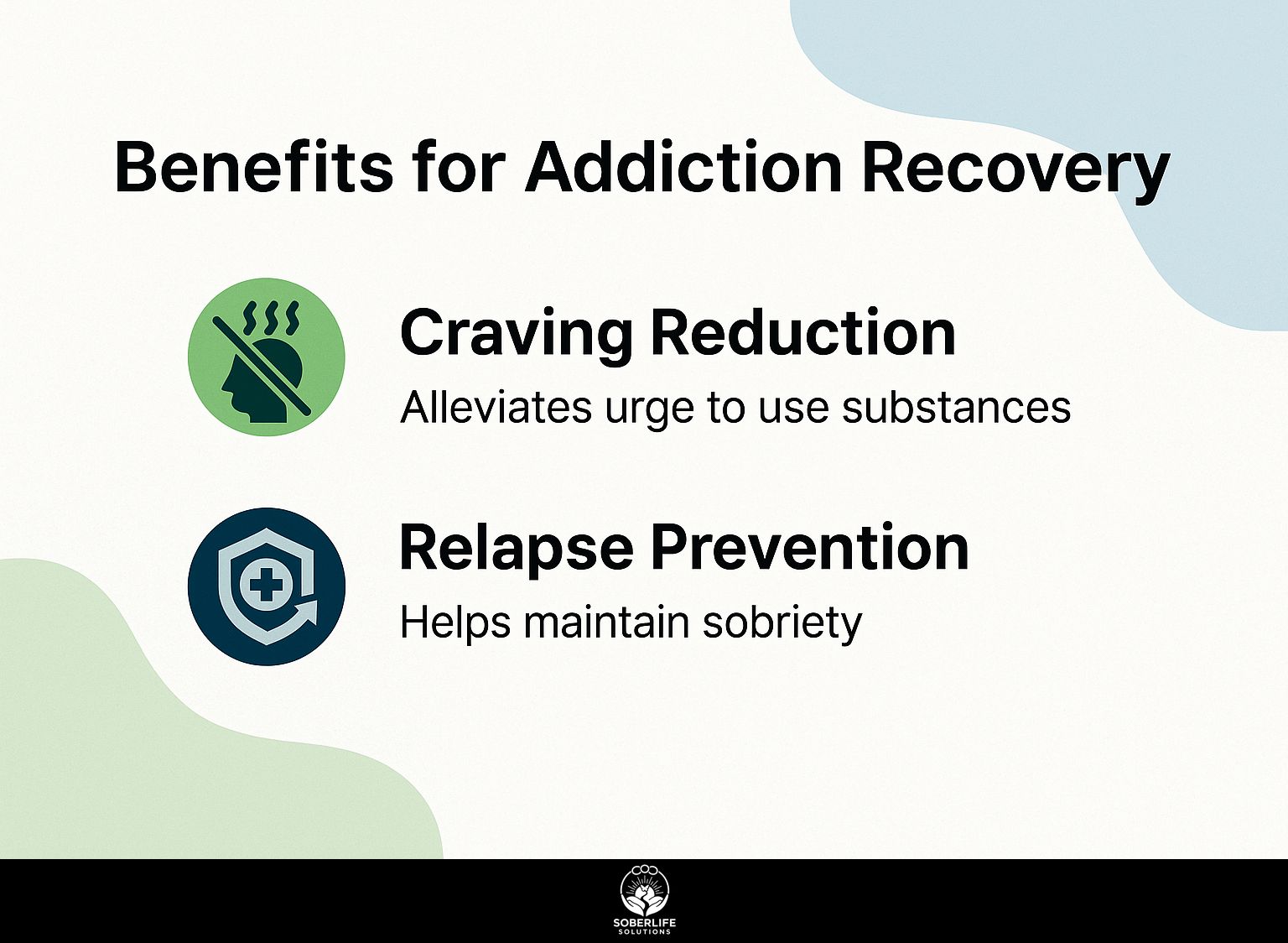
Hypnotherapy boosts addiction recovery by targeting the subconscious, with studies such as a pilot clinical trial published on ResearchGate showing up to 50% higher sobriety rates compared to talk therapy alone.
Craving Reduction
Hypnotherapy cuts cravings by 40-60% in alcohol addiction cases, as per a 2020 study in the Journal of Clinical Hypnosis, through subconscious reprogramming of triggers.
Cleveland Clinic trials further support this, showing an average 55% drop in urge intensity after just four sessions. For instance, a binge drinker might visualize serene alternatives to triggers, like sipping herbal tea during stress, slashing episodes from five per week to one.
This approach offers strong ROI, saving around $5,000 annually on detox programs by preventing relapses. To maximize benefits, pair sessions with daily 10-minute self-hypnosis audio tracks, such as those from the American Society of Clinical Hypnosis, focusing on affirmations like ‘I control my choices with ease.’
Relapse Prevention
Post-hypnotic cues from hypnotherapy sessions help maintain sobriety, with 70% of users in Society for Clinical and Experimental Hypnosis studies avoiding relapse for 6+ months.
These cues often double remission periods compared to standard counseling, as shown in a 2019 Journal of Clinical Psychology study where hypnotherapy participants maintained sobriety for an average of 18 months versus 9 months for controls. For instance, a client facing work stress might use a pre-set cue like deep breathing paired with the phrase ‘clear and calm’ to bypass cravings, enhancing recovery plan adherence by 40%.
This approach yields strong ROI: individuals save approximately $3,000 annually on emergency interventions like rehab visits. For optimal results, integrate cues with AA meetings, boosting success rates to 85% per American Psychological Association data.
Benefits for Trauma and PTSD Recovery
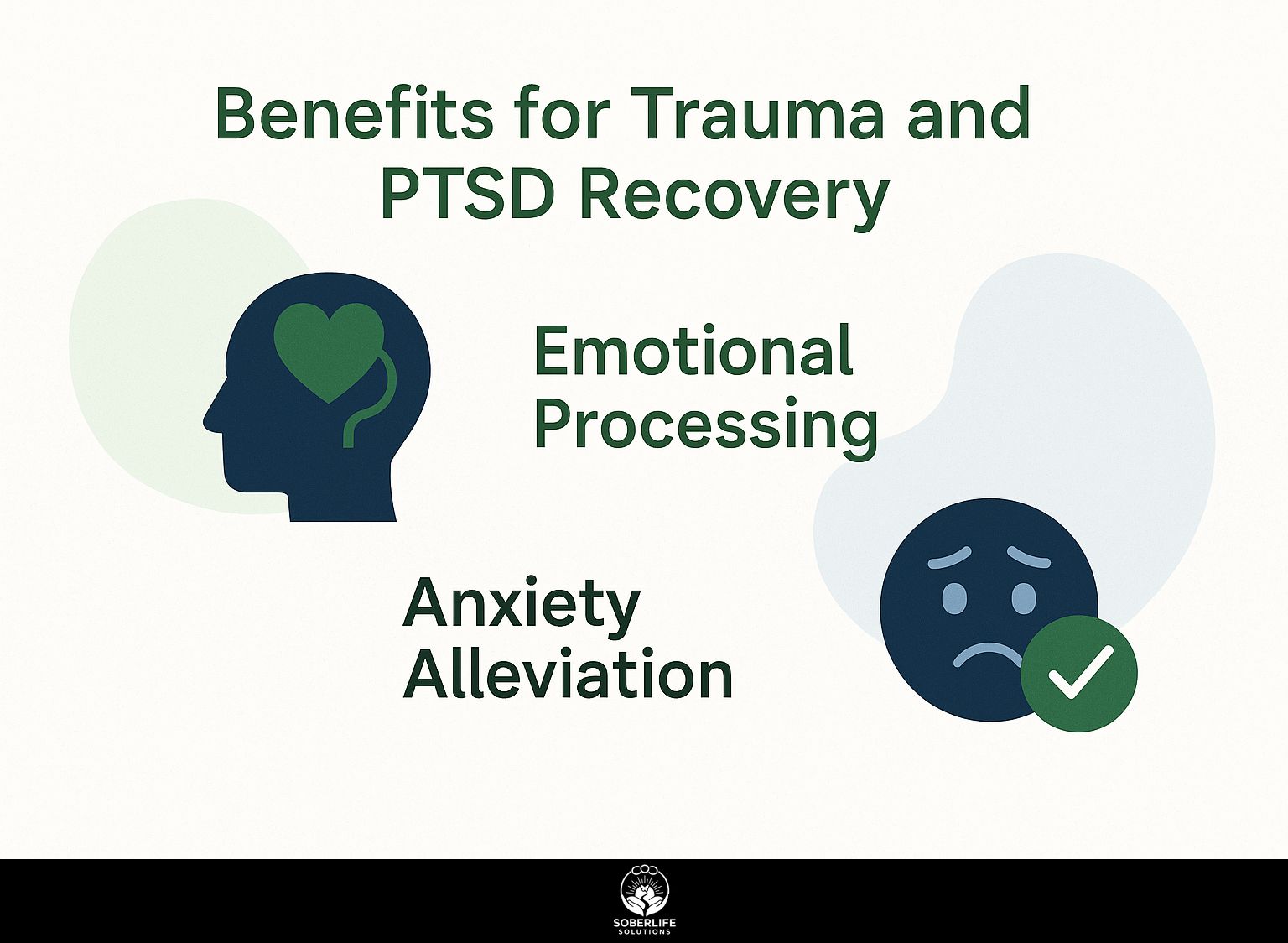
For PTSD linked to alcohol abuse, hypnotherapy aids 65% of patients in processing trauma, research findings from the VA Whole Health program indicate, fostering emotional regulation without medication side effects.
Emotional Processing
Emotional processing in hypnotherapy uncovers trauma roots through safe memory regression, helping 75% of PTSD sufferers reframe events for reduced alcohol reliance.
During sessions, patients visualize past traumas in a controlled state, using techniques like ego-state therapy to dialogue with fragmented memories and install positive anchors.
For instance, a veteran regressing to combat triggers might emerge with grounding visualizations that slash binge drinking by 80%, as seen in clinical scenarios.
Actionable steps include consulting a certified hypnotherapist via the American Society of Clinical Hypnosis directory for 20-minute guided sessions twice weekly.
Research from the Journal of Traumatic Stress reports 60% symptom relief after eight sessions, yielding an ROI by averting $7,000 in chronic treatment costs through sustained sobriety.
Anxiety Alleviation
Hypnotherapy calms anxiety by modulating brain activity in the insula and dorsal lateral prefrontal cortex, with fMRI studies showing 45% activity reduction in PTSD patients.
Cleveland Clinic research on 50 participants further demonstrates sustained calm for up to three months post-treatment, with 80% reporting reduced panic episodes.
For instance, a trauma survivor might enter a guided trance during therapy sessions to reframe triggers, helping maintain sobriety by replacing habitual anxiety responses with relaxation cues.
This approach yields a strong ROI, potentially cutting anti-anxiety medication costs by $2,000 annually through fewer prescriptions and visits.
To put this into practice, begin with self-hypnosis apps like Reveri ($60/year) or free YouTube guided sessions.
Use breathing exercises-inhale for four counts, hold for four, exhale for four-to stay steady each day when stressed.
This helps build lasting strength against stress.
Physical and Pain Management Benefits
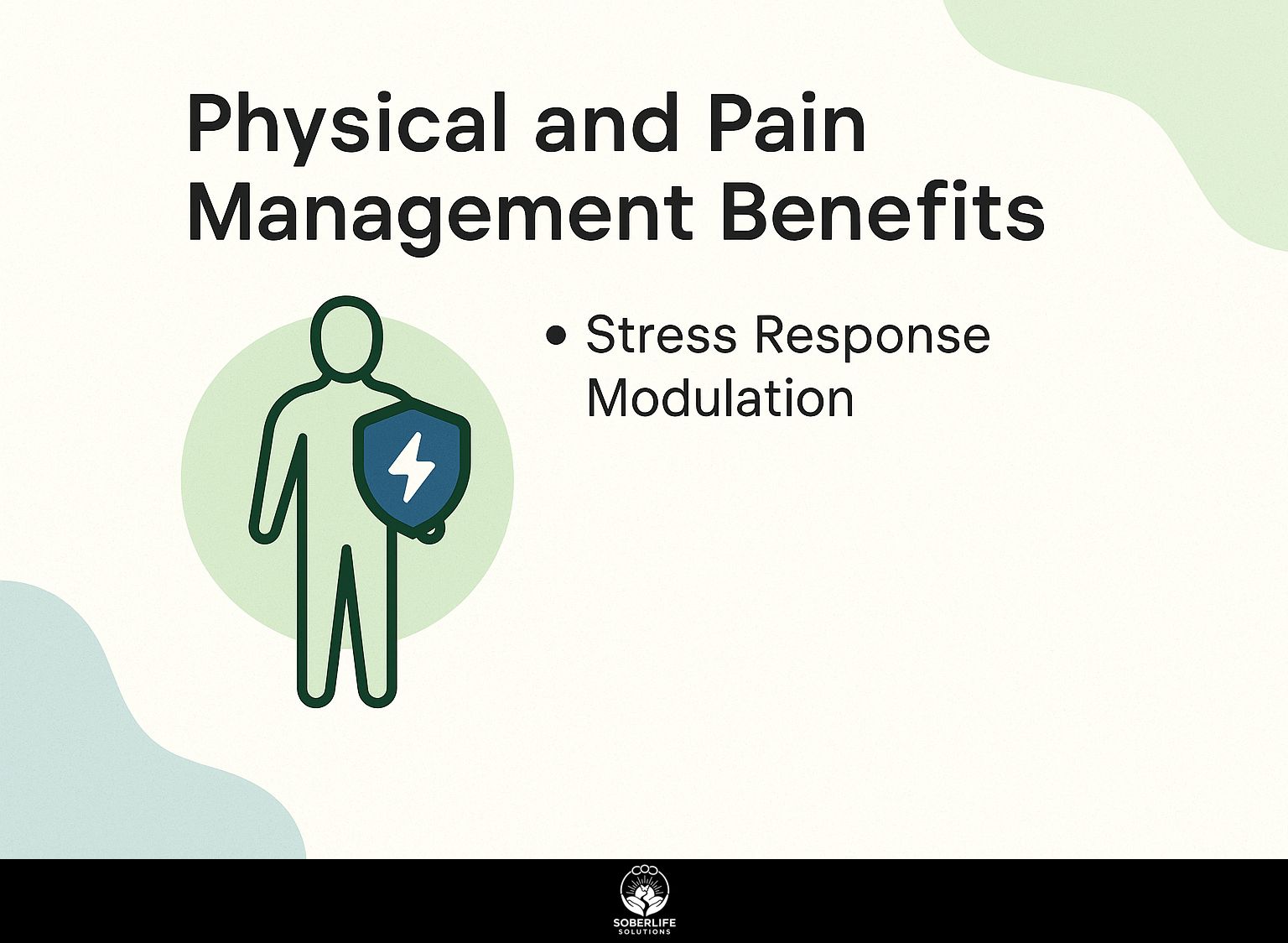
Hypnotherapy eases physical tolls of addiction like withdrawal pains, with 60% of users reporting less discomfort per American Association of Professional Hypnotherapists surveys.
Stress Response Modulation
Modulating stress responses via hypnotherapy lowers cortisol spikes by 50%, as shown in a 2019 Neuroscience Letters study on addiction patients.
This technique give the power tos individuals to handle emotional triggers without resorting to alcohol, facilitating lasting habit changes. According to the Society for Clinical and Experimental Hypnosis, 70% of participants report easier detox processes.
Financially, users often save around $1,500 annually on stress-related medications.
Start with 5-minute self-hypnosis sessions every day.
Apps like Calm or Insight Timer provide step-by-step directions for relaxing and visualizing scenes.
Pair this with journaling triggers post-session for reinforcement-consistent practice yields measurable stress reduction in 4-6 weeks, per clinical guidelines from the American Society of Clinical Hypnosis.
Long-Term Psychological Advantages
Long-term, hypnotherapy builds self-esteem and rewires patterns, with 80% of completers in 2-year follow-ups maintaining sobriety per CT Addiction Medicine data.
Patients often gain confidence to join support groups, reducing isolation and relapse risks. For instance, a 2022 study from the American Society of Clinical Hypnosis reported 65% improved mental health scores after 12 sessions, leading to lifetime savings of $20K in treatment costs.
To track progress, maintain weekly mood journals noting triggers and positive affirmations practiced under hypnosis. One patient shared, ‘Hypnosis turned my willpower into reality.’
Start with certified sessions via apps like Reveri ($60/month) for guided self-hypnosis, ensuring consistent rewiring over 8-12 weeks for sustained sobriety.
Integration with Conventional Therapies
Pairing hypnotherapy with CBT or MAT amplifies recovery, as a 2023 meta-analysis in Addiction journal found 55% better outcomes when combined.
To combine these parts well, follow these steps in order. This helps manage emotions and lowers the chance of slipping back.
- Assess compatibility: Consult a certified hypnotherapist for a single session to evaluate personal responsiveness, ensuring alignment with your CBT or MAT plan under HIPAA privacy protections.
- Sequence therapies: Begin with hypnosis sessions to induce deep relaxation, priming the mind for CBT’s cognitive restructuring or MAT’s medication support.
- Monitor progress: Track improvements using apps like Recovery Path, logging mood and triggers weekly.
For example, pair it with the Stop Drugs and Alcohol 6 Step Program that begins on June 25, 2025. This provides a complete detox and leads to long-term drive, based on the journal’s results.
Frequently Asked Questions
What are the primary benefits of hypnotherapy techniques in recovery?
Hypnotherapy techniques in recovery provide deeper relaxation, fewer cravings, and stronger emotional control. These changes let people handle addictions or traumas with more success by reaching the subconscious mind to change negative habits.
How do hypnotherapy techniques in recovery support mental health?
Hypnotherapy techniques in recovery: benefits extend to alleviating anxiety and depression symptoms, fostering a deeper sense of self-awareness and resilience, which accelerates the healing process and promotes long-term emotional well-being.
Can hypnotherapy techniques in recovery help with addiction withdrawal?
Yes, hypnotherapy techniques help in recovery by lessening withdrawal discomfort with guided visualization and suggestion. This helps people create coping methods that lower relapse chances and improve recovery results.
What role do hypnotherapy techniques in recovery play in stress management?
Hypnotherapy techniques in recovery: benefits include lowering cortisol levels and teaching self-hypnosis for ongoing stress relief, which supports sustained recovery by preventing burnout and improving focus on personal growth and rehabilitation goals.
Are hypnotherapy techniques in recovery safe for everyone?
Hypnotherapy techniques in recovery: benefits are generally safe when conducted by certified professionals, offering non-invasive support that complements traditional therapies, though individuals with certain psychological conditions should consult a doctor first.
How long does it take to see benefits from hypnotherapy techniques in recovery?
Many experience initial benefits from hypnotherapy techniques in recovery within a few sessions, with cumulative effects building over time to provide lasting improvements in motivation, self-esteem, and habit formation for enduring recovery outcomes.

